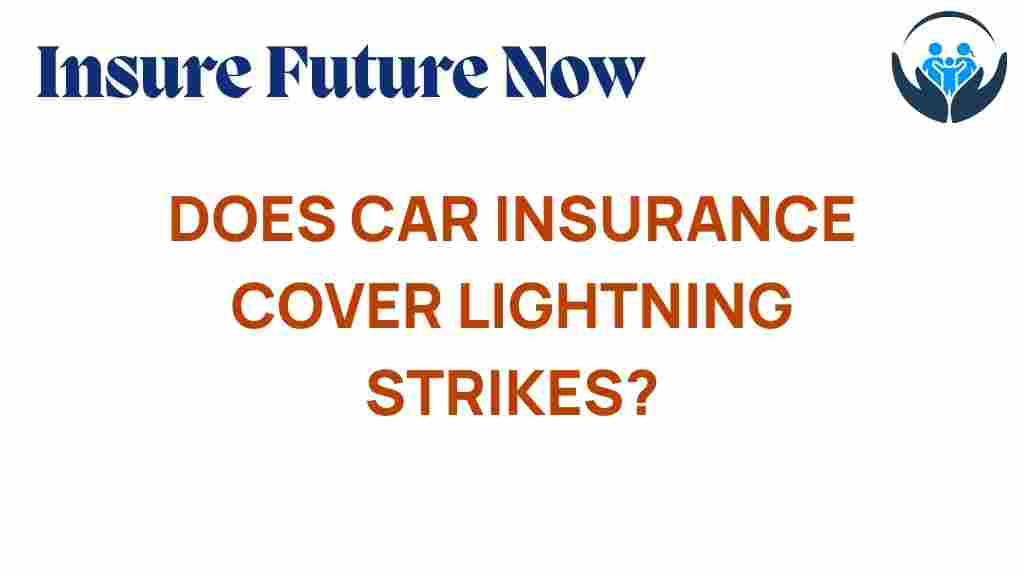Unraveling the Mystery: Does Car Insurance Cover Lightning Strikes?
When it comes to natural disasters, lightning strikes are one of the most fascinating yet destructive forces of nature. While we often think of floods or hurricanes when considering weather-related vehicle damage, lightning strikes can also cause significant harm to your car. But does car insurance cover lightning strikes? This question can leave many vehicle owners puzzled as they navigate the complexities of insurance policies and coverage. In this article, we will explore the relationship between car insurance, lightning strikes, and how to ensure that you have adequate insurance protection against storm-related incidents.
Understanding Car Insurance Coverage
Before we dive into the specifics of lightning strikes, it’s essential to understand the basics of car insurance. Car insurance is designed to provide financial protection in the event of accidents, theft, and sometimes natural disasters. However, not all policies are created equal. Here are the primary types of coverage relevant to our discussion:
- Liability Coverage: Covers damages you cause to others in an accident.
- Collision Coverage: Covers damage to your vehicle due to a collision, regardless of fault.
- Comprehensive Coverage: Protects against theft, vandalism, and natural disasters, including lightning strikes.
To ensure that you have the right protection, it’s crucial to understand what each type of coverage entails and how it applies to various situations, including vehicle damage from lightning strikes.
Does Car Insurance Cover Lightning Strikes?
The answer to whether car insurance covers lightning strikes primarily depends on the type of policy you have. If you carry comprehensive coverage, your policy is likely to cover damages resulting from lightning strikes. This coverage typically includes:
- Direct damage to the vehicle from a lightning strike.
- Fire damage caused by the lightning.
- Electrical system failures due to a strike.
However, if you only have liability or collision coverage, you may find yourself unprotected against the effects of lightning strikes. Therefore, it is crucial to review your policy details to understand your coverage fully.
How Lightning Strikes Cause Vehicle Damage
Lightning strikes can lead to various types of damage to your vehicle, which can be extensive and costly to repair. Here are a few ways in which lightning can cause vehicle damage:
- Electrical Damage: Lightning can cause surges that damage the vehicle’s electrical systems, leading to costly repairs.
- Fire Damage: A lightning strike can ignite a fire in or around the vehicle, leading to significant loss.
- Structural Damage: Though rare, a direct strike can cause structural issues to the vehicle’s body or components.
Understanding these potential damages can help you assess the risks and evaluate the importance of having comprehensive coverage in your car insurance policy.
Steps to Take After a Lightning Strike
If your vehicle has been struck by lightning, it’s essential to take the right steps to ensure that you can file a claim effectively. Here’s a step-by-step process:
- Ensure Safety: First and foremost, make sure you are safe. If you are in the car during a storm, stay inside until it’s safe to exit.
- Assess Damage: Once safe, inspect your vehicle for visible damage, such as burned areas or electrical issues.
- Document Everything: Take photographs of the damage, and make notes about the incident, including the time and place.
- Contact Your Insurance Company: Report the incident to your insurer as soon as possible and provide them with all the documentation.
- Follow Up: Keep track of your claim status and follow up with your insurance adjuster for any additional information they may need.
Following these steps can help streamline the claims process and ensure that you receive the necessary compensation for your vehicle damage.
Common Claims Related to Lightning Strikes and Storm-Related Incidents
When it comes to claims related to lightning strikes and storm-related incidents, here are some common types that may be covered under comprehensive car insurance:
- Electrical System Claims: If a lightning strike damages your vehicle’s electrical systems, you can file a claim for repairs.
- Fire Damage Claims: Claims can be filed for damage caused by a fire ignited by a lightning strike.
- Loss of Vehicle: In severe cases where the vehicle is deemed a total loss, you may receive compensation for the vehicle’s value.
Be sure to check your policy details to understand the specific coverage and limits related to these claims.
Troubleshooting Tips for Vehicle Damage from Storm-Related Incidents
After experiencing a storm-related incident, here are some troubleshooting tips to help you assess your vehicle’s condition:
- Check for Electrical Issues: If your car won’t start or the lights flicker, there may be electrical damage.
- Look for Burn Marks: Inspect the vehicle for any burn marks or signs of fire damage.
- Listen for Unusual Noises: If you hear strange sounds, it may indicate underlying damage.
- Consult a Professional: If you suspect significant damage, have a qualified mechanic perform a thorough inspection.
Regular maintenance and prompt attention to potential issues can help mitigate further damage.
Conclusion
In conclusion, understanding whether car insurance covers lightning strikes is essential for vehicle owners, especially those living in areas prone to severe weather. Comprehensive coverage is your best bet for protection against the damages caused by lightning and other natural disasters. By being proactive and informed about your car insurance policy, you can ensure that you are adequately protected against the risks associated with storm-related incidents.
If you’re unsure about your current coverage or need assistance, consider speaking with your insurance agent or exploring options for enhanced insurance protection. Remember, being prepared can save you time, stress, and money in the long run. For further reading on car insurance and natural disasters, check out this comprehensive guide.
Lastly, always stay informed about your rights and responsibilities as a policyholder to make the most of your coverage and protect your vehicle from unexpected events.
This article is in the category Coverage and created by InsureFutureNow Team
